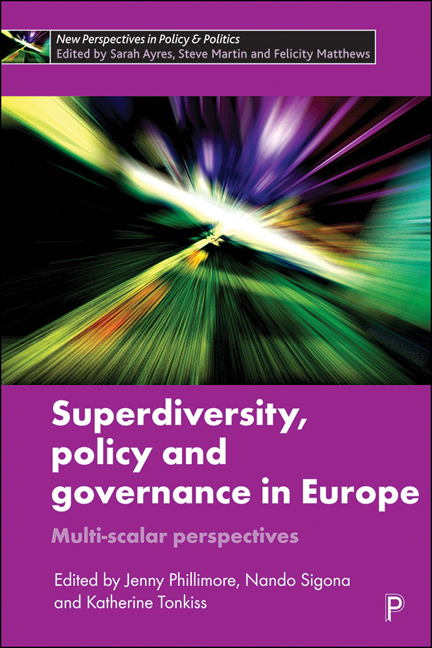Book contents
- Frontmatter
- Contents
- List of Figures and Tables
- Notes on Contributors
- Introduction: Superdiversity, Policy and Governance in Europe
- Chapter One Managing Superdiversity? Examining the Intercultural Policy Turn in Europe
- Chapter Two Mainstreaming in Response to Superdiversity? The Governance of Migration-Related Diversity in France, The UK and the Netherlands
- Chapter Three Making the Most of Superdiversity: Notes on the Potential of a New Approach
- Chapter Four Superdiversity and Sub-National Autonomous Regions: Perspectives from the South Tyrolean Case
- Chapter Five Transmigration: The Rise of Flexible Migration Strategies as Part of Superdiversity
- Chapter Six Superdiversity, Multiculturalism and Local Policies: A Study on European Cities
- Chapter Seven Integrating Superdiversity in Urban Governance: The Case of Inner-city Lisbon
- Chapter Eight Urban Planning and the Challenge of Superdiversity
- Chapter Nine Superdiversity in the Post-Industrial City: A Comparative Analysis of Backlash Narratives in Six European Neighbourhoods
- Index
Chapter Seven - Integrating Superdiversity in Urban Governance: The Case of Inner-city Lisbon
Published online by Cambridge University Press: 04 March 2021
- Frontmatter
- Contents
- List of Figures and Tables
- Notes on Contributors
- Introduction: Superdiversity, Policy and Governance in Europe
- Chapter One Managing Superdiversity? Examining the Intercultural Policy Turn in Europe
- Chapter Two Mainstreaming in Response to Superdiversity? The Governance of Migration-Related Diversity in France, The UK and the Netherlands
- Chapter Three Making the Most of Superdiversity: Notes on the Potential of a New Approach
- Chapter Four Superdiversity and Sub-National Autonomous Regions: Perspectives from the South Tyrolean Case
- Chapter Five Transmigration: The Rise of Flexible Migration Strategies as Part of Superdiversity
- Chapter Six Superdiversity, Multiculturalism and Local Policies: A Study on European Cities
- Chapter Seven Integrating Superdiversity in Urban Governance: The Case of Inner-city Lisbon
- Chapter Eight Urban Planning and the Challenge of Superdiversity
- Chapter Nine Superdiversity in the Post-Industrial City: A Comparative Analysis of Backlash Narratives in Six European Neighbourhoods
- Index
Summary
Introduction
The aim of this chapter is to analyse how local urban governance has come to incorporate migration-driven superdiversity in policies, mainly in the realm of mixed cultural and economic development policies. To do this, we use the case of the Mouraria neighbourhood in Lisbon, arguing that it is a site where a number of strategies have been identified to work towards new forms of accommodating old and new diversities to produce a specific cosmopolitan sense based on a ‘diversity advantage’ approach.
In the context of an ‘urban turn’ in migration studies (Çağlar, 2015), migrants’ trajectories and practices are being progressively analysed in the intersection of global dynamics and local policies, structures and institutions. The shift in focus within migration scholarship from the national towards subnational levels signals a growing interest in the local as a socio-spatial context where practices, social relations and power networks take place. How migrants relate to this array of factors in the urban environment has been highlighted by a number of studies (Hadj-Abdou, 2014; Çağlar and Schiller, 2011; Alexander, 2007; Schiller and Çağlar, 2015). There is still, however, a need to relate these approaches to the so-called superdiverse urban settings looking at their relationship with new urban governance approaches based on the entrepreneurial city model (Harvey, 2001). Given that migration scholars have urged us to consider a greater diversity in these settings (Vertovec, 2007; Nowicka and Vertovec, 2014), what is still missing is an explicit link between the new social conditions and urban power hierarchies, social configurations and practices, in short, between superdiversity and urban governance.
Central to the new European model for managing diversity is the idea of ‘diversity advantage’ (Wood and Landry, 2008). Basically, this concept encapsulates the idea that diversity should be seen as a resource to be harnessed. It is intrinsically linked to cities’ innovative policies and to economic comparative advantage whenever diversity is utilised as an asset (Wood and Landry, 2008, 12).
This chapter tries to understand how such linkages have come about in Lisbon, highlighting three urban strategies: de-ethnicisation of superdiversity and urban growth policies, aestheticisation of diversity and the rationale of the encounter, and place marketing and city branding.
- Type
- Chapter
- Information
- Superdiversity, Policy and Governance in EuropeMulti-scalar Perspectives, pp. 146 - 167Publisher: Bristol University PressPrint publication year: 2020



